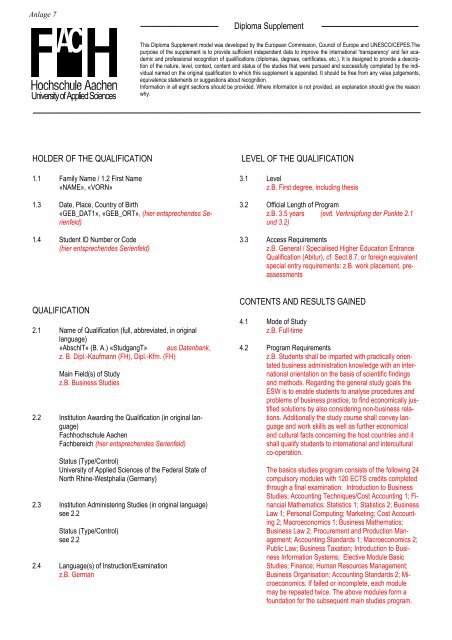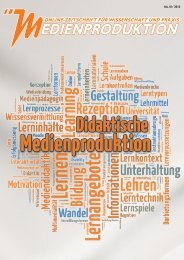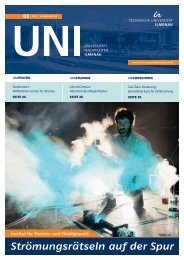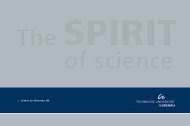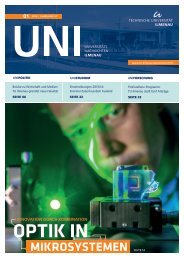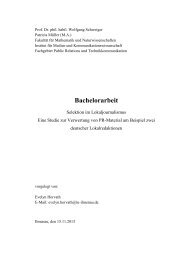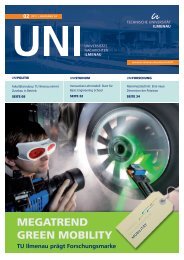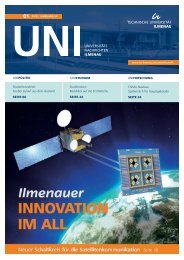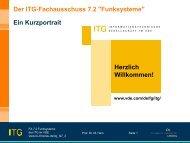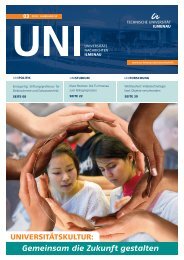University of Applied Sciences
University of Applied Sciences
University of Applied Sciences
You also want an ePaper? Increase the reach of your titles
YUMPU automatically turns print PDFs into web optimized ePapers that Google loves.
Anlage 7<br />
<strong>University</strong> <strong>of</strong> <strong>Applied</strong> <strong>Sciences</strong><br />
Diploma Supplement<br />
This Diploma Supplement model was developed by the European Commission, Council <strong>of</strong> Europe and UNESCO/CEPES.The<br />
purpose <strong>of</strong> the supplement is to provide sufficient independent data to improve the international 'transparency' and fair academic<br />
and pr<strong>of</strong>essional recognition <strong>of</strong> qualifications (diplomas, degrees, certificates, etc.). It is designed to provide a description<br />
<strong>of</strong> the nature, level, context, content and status <strong>of</strong> the studies that were pursued and successfully completed by the individual<br />
named on the original qualification to which this supplement is appended. It should be free from any value judgements,<br />
equivalence statements or suggestions about recognition.<br />
Information in all eight sections should be provided. Where information is not provided, an explanation should give the reason<br />
why.<br />
HOLDER OF THE QUALIFICATION<br />
1.1 Family Name / 1.2 First Name<br />
«NAME», «VORN»<br />
1.3 Date, Place, Country <strong>of</strong> Birth<br />
«GEB_DAT1», «GEB_ORT», (hier entsprechendes Serienfeld)<br />
1.4 Student ID Number or Code<br />
(hier entsprechendes Serienfeld)<br />
LEVEL OF THE QUALIFICATION<br />
3.1 Level<br />
z.B. First degree, including thesis<br />
3.2 Official Length <strong>of</strong> Program<br />
z.B. 3.5 years (evtl. Verknüpfung der Punkte 2.1<br />
und 3.2)<br />
3.3 Access Requirements<br />
z.B. General / Specialised Higher Education Entrance<br />
Qualification (Abitur), cf. Sect.8.7, or foreign equivalent<br />
special entry requirements: z.B. work placement, preassessments<br />
QUALIFICATION<br />
2.1 Name <strong>of</strong> Qualification (full, abbreviated, in original<br />
language)<br />
«AbschlT» (B. A.) «StudgangT» aus Datenbank,<br />
z. B. Dipl.-Kaufmann (FH), Dipl.-Kfm. (FH)<br />
Main Field(s) <strong>of</strong> Study<br />
z.B. Business Studies<br />
2.2 Institution Awarding the Qualification (in original language)<br />
Fachhochschule Aachen<br />
Fachbereich (hier entsprechendes Serienfeld)<br />
Status (Type/Control)<br />
<strong>University</strong> <strong>of</strong> <strong>Applied</strong> <strong>Sciences</strong> <strong>of</strong> the Federal State <strong>of</strong><br />
North Rhine-Westphalia (Germany)<br />
2.3 Institution Administering Studies (in original language)<br />
see 2.2<br />
Status (Type/Control)<br />
see 2.2<br />
2.4 Language(s) <strong>of</strong> Instruction/Examination<br />
z.B. German<br />
CONTENTS AND RESULTS GAINED<br />
4.1 Mode <strong>of</strong> Study<br />
z.B. Full-time<br />
4.2 Program Requirements<br />
z.B. Students shall be imparted with practically orientated<br />
business administration knowledge with an international<br />
orientation on the basis <strong>of</strong> scientific findings<br />
and methods. Regarding the general study goals the<br />
ESW is to enable students to analyse procedures and<br />
problems <strong>of</strong> business practice, to find economically justified<br />
solutions by also considering non-business relations.<br />
Additionally the study course shall convey language<br />
and work skills as well as further economical<br />
and cultural facts concerning the host countries and it<br />
shall qualify students to international and intercultural<br />
co-operation.<br />
The basics studies program consists <strong>of</strong> the following 24<br />
compulsory modules with 120 ECTS credits completed<br />
through a final examination: Introduction to Business<br />
Studies; Accounting Techniques/Cost Accounting 1; Financial<br />
Mathematics; Statistics 1; Statistics 2; Business<br />
Law 1; Personal Computing; Marketing; Cost Accounting<br />
2; Macroeconomics 1; Business Mathematics;<br />
Business Law 2; Procurement and Production Management;<br />
Accounting Standards 1; Macroeconomics 2;<br />
Public Law; Business Taxation; Introduction to Business<br />
Information Systems; Elective Module Basic<br />
Studies; Finance; Human Resources Management;<br />
Business Organisation; Accounting Standards 2; Microeconomics.<br />
If failed or incomplete, each module<br />
may be repeated twice. The above modules form a<br />
foundation for the subsequent main studies program.
Diploma Supplement <strong>of</strong> the Aachen <strong>University</strong> <strong>of</strong> <strong>Applied</strong> <strong>Sciences</strong> Page 2 <strong>of</strong> 5<br />
The main studies program is made up <strong>of</strong> 12 modules<br />
with 60 ECTS credits which are also each completed<br />
by a final examination. If failed or incomplete, each<br />
module may be repeated twice. Upon studying regularly<br />
according to the stipulations <strong>of</strong> the course regulations,<br />
the student has an additional attempt to complete<br />
a particular module in this program. Besides the compulsory<br />
modules Business Management (inc. business<br />
game) and Balance Sheet Analysis/Controlling, the<br />
student has to select from the catalogue two main options<br />
consisting <strong>of</strong> three modules each. Moreover, the<br />
student has to choose two compulsory modules from a<br />
special catalogue as well as two additional elective<br />
modules. The additional elective modules <strong>of</strong> at least 5<br />
ECTS credits each can be selected from the faculty<br />
course catalogue or from the course catalogues <strong>of</strong><br />
other faculties <strong>of</strong> the university. The entire study program<br />
is completed with an honours project and an oral<br />
examination on this project (30 ECTS credits).<br />
4.3 Program Details<br />
z.B. See “Abschlusszeugnis” (Final Examination Certificate)<br />
for subjects taken in written and oral examinations<br />
and topic <strong>of</strong> thesis, including evaluations.<br />
4.4 Grading scheme<br />
General grading scheme (Sect. 8.6) "Excellent";<br />
"Good"; "Satisfactory", "Poor", "Failing". Additionally,<br />
the ECTS grading scheme is being prepared.<br />
4.5 Overall classification<br />
«FNoteT1»<br />
Based on weighted average referring to the regulations<br />
<strong>of</strong> the study programme. Additionally the ECTS grading<br />
scheme is being prepared.<br />
FUNCTION OF THE QUALIFICATION<br />
5.1 Access to Further Study<br />
z.B. Qualifies to apply for admission to Master and<br />
doctoral studies<br />
5.2 Pr<strong>of</strong>essional Status<br />
z.B. The Diplom-degree in this discipline entitles its<br />
holder to the legally protected pr<strong>of</strong>essional title "Diplom-Kaufmann<br />
(FH)"/”Diplom-Kauffrau (FH)” and to exercise<br />
pr<strong>of</strong>essional work in the field(s) <strong>of</strong> economics<br />
and business management for which the degree was<br />
awarded.<br />
ADDITIONAL INFORMATION<br />
6.1 Additional Information<br />
6.2 Further Information Sources<br />
About the institution: http://www.fh-aachen.de/<br />
About the faculty: freies Eingabefeld<br />
CERTIFICATION<br />
This Diploma Supplement refers to the following original<br />
documents:<br />
z.B. Diplomurkunde (Serienfeld Abschlussdatum)<br />
z.B. Diplomzeugnis (Serienfeld Abschlussdatum)<br />
z.B. Notenübersicht (Serienfeld Abschlussdatum)<br />
Certification Date:<br />
Aachen, (date <strong>of</strong> issue)<br />
(Serienfeld Abschlussdatum)<br />
freies Eingabefeld<br />
Feld für individuelle Einträge, z. B. Zusatzmodule, evtl.<br />
Praxis- oder Auslandssemester, studentische Tätigkeiten,<br />
Umdiplomierung, Überwechsler von anderen<br />
Hochschulen etc.<br />
Name des Prüfungsausschussvorsitzenden<br />
Chairman <strong>of</strong> the Examination Board
Diploma Supplement <strong>of</strong> the Aachen <strong>University</strong> <strong>of</strong> <strong>Applied</strong> <strong>Sciences</strong> Page 3 <strong>of</strong> 5<br />
8. INFORMATION ON THE GERMAN<br />
HIGHER EDUCATION SYSTEM 1<br />
8.1. Types <strong>of</strong> Institutions and Institutional Control<br />
Higher education (HE) studies in Germany are <strong>of</strong>fered at<br />
three types <strong>of</strong> Hochschulen 2 :<br />
- Universitäten (Universities), including various specialized<br />
institutions, comprise the whole range <strong>of</strong> academic<br />
disciplines. In the German tradition, universities<br />
are also institutional foci <strong>of</strong>, in particular, basic research,<br />
so that advanced stages <strong>of</strong> study have strong<br />
theoretical orientations and research-oriented components.<br />
- Fachhochschulen (Universities <strong>of</strong> <strong>Applied</strong> <strong>Sciences</strong>)<br />
concentrate on engineering and other technical disciplines,<br />
business-related studies, social work, and design<br />
areas. Research and development are mostly<br />
application-oriented. Thus a distinct applicationoriented<br />
focus and pr<strong>of</strong>essional character <strong>of</strong> studies is<br />
implied.<br />
- Kunst- and Musikhochschulen (Colleges <strong>of</strong> Art/Music,<br />
etc.) <strong>of</strong>fer graduate studies for artistic careers in fine<br />
arts, performing arts and music; in such fields as directing,<br />
production, writing in theatre, film, and other<br />
media; and in a variety <strong>of</strong> design areas, architecture,<br />
media and communication.<br />
HE institutions are either state or state-recognized institutions.<br />
In their operations, including the organization <strong>of</strong><br />
studies and the designation and award <strong>of</strong> degrees, they<br />
are both subject to HE legislation.<br />
8.2 Types <strong>of</strong> programs and degrees awarded<br />
- In 1998, a new scheme <strong>of</strong> first- and second-level<br />
degree programs (Bakkalaureus/Bachelor and Magister/Master)<br />
was introduced. The European Community<br />
member states agreed on the common structure<br />
in order to enhance variety, flexibility and international<br />
compatibility.<br />
- Studies in all three types <strong>of</strong> institutions are traditionally<br />
<strong>of</strong>fered in integrated "long" (one-tier) programs<br />
leading to Diplom- or Magister Artium degrees or<br />
completion by a Staatsprüfung (State Examination).<br />
These “long” programs can be <strong>of</strong>fered parallel to or<br />
instead <strong>of</strong> Bachelor/Master programs.<br />
1 The information covers only aspects directly relevant<br />
to purposes <strong>of</strong> the Diploma Supplement.<br />
All information as <strong>of</strong> 1 Jan 2000 .<br />
2 Hochschule is the generic term for higher education<br />
institutions.<br />
- For details cf. Sec. 8.41 and Sec. 8.42., respectively.<br />
Table 1 provides a synoptic summary.<br />
8.3 Approval/Accreditation <strong>of</strong> Programs and Degrees<br />
To ensure quality and comparability <strong>of</strong> qualifications, the<br />
organization <strong>of</strong> studies and general degree requirements<br />
have to conform to principles and regulations jointly<br />
established by the Standing Conference <strong>of</strong> Ministers <strong>of</strong><br />
Education and Cultural Affairs <strong>of</strong> the Länder in the Federal<br />
Republic <strong>of</strong> Germany (KMK) and the Association <strong>of</strong><br />
Universities and Other Higher Education Institutions in<br />
Germany (HRK). In 1999, a system <strong>of</strong> accreditation for<br />
programs <strong>of</strong> study has become operational under the<br />
control <strong>of</strong> an Accreditation Council at national level.<br />
Programs and qualifications accredited under this<br />
scheme are designated accordingly in the Diploma Supplement.<br />
8.4 Organization <strong>of</strong> Studies<br />
8.41 First/Second Degree Programs (Two-tier): Bakkalaureus/Bachelor<br />
and Magister/Master degrees<br />
These programs apply to all three types <strong>of</strong> institutions.<br />
Their organization makes use <strong>of</strong> ECTS and modular<br />
components. First degree programs (3 to 4 years) lead to<br />
Bakkalaureus/Bachelor degrees (B.A., B.Sc.). Graduate<br />
second degree programs (1 to 2 years) lead to Magister/Master<br />
degrees (M.A., M.Sc.). Both may be awarded<br />
in dedicated form to indicate particular specializations or<br />
applied/pr<strong>of</strong>essional orientations (B./M. <strong>of</strong> ... ; B.A., B.Sc.<br />
or M.A., M.Sc. in ... ). All degrees include a thesis requirement.<br />
8.42 Integrated "Long" Programs (One-Tier): Diplom<br />
degrees, Magister Artium, Staats-prüfung<br />
These traditional studies are either mono-disciplinary<br />
(single subject, Diplom degrees, most programs completed<br />
by a Staatsprüfung) or comprise a combination <strong>of</strong><br />
either two major or one major and two minor fields (Magister<br />
Artium ). As common characteristics, in the absence<br />
<strong>of</strong> intermediate (first-level) degrees, studies are divided<br />
into two stages. The first stage (1.5 to 2 years) focuses -<br />
without any components <strong>of</strong> general education - on broad<br />
orientations and foundations <strong>of</strong> the field(s) <strong>of</strong> study including<br />
propaedeutical subjects. An Intermediate Examination<br />
(Diplom-Vorprüfung for Diplom degrees;<br />
Zwischenprüfung or credit requirements for the M.A.) is<br />
prerequisite to enter the second stage <strong>of</strong> advanced studies<br />
and specializations. Degree requirements always<br />
3
Diploma Supplement <strong>of</strong> the Aachen <strong>University</strong> <strong>of</strong> <strong>Applied</strong> <strong>Sciences</strong> Page 4 <strong>of</strong> 5<br />
include submission <strong>of</strong> a thesis (up to 6 months duration)<br />
and comprehensive final written and oral examinations.<br />
Similar regulations apply to studies leading to a<br />
Staatsprüfung.<br />
- Studies at Universities last usually 4.5 years (Diplom<br />
degree, Magister Artium) or 3.5 to 6 years<br />
(Staatsprüfung). The Diplom degree is awarded in<br />
engineering disciplines, the exact/natural and economic<br />
sciences. In the humanities, the corresponding<br />
degree is usually the Magister Artium (M.A.). In the<br />
social sciences, the practice varies as a matter <strong>of</strong> institutional<br />
traditions. Studies preparing for the legal,<br />
medical, pharmaceutical and teaching pr<strong>of</strong>essions are<br />
completed by a Staatsprüfung.<br />
The three qualifications are academically equivalent<br />
As the final (and only) degrees <strong>of</strong>fered in these programs<br />
at graduate-level, they qualify to apply for admission<br />
to doctoral studies, cf. Sec. 8.5.<br />
- Studies at Fachhochschulen (FH) /Universities <strong>of</strong> <strong>Applied</strong><br />
<strong>Sciences</strong> (UAS) last 4 years and lead to a Diplom<br />
(FH) degree. While the FH/UAS are nondoctorate<br />
granting institutions, qualified graduates<br />
may pursue doctoral work at doctorate-granting institutions,<br />
cf. Sec. 8.5.<br />
- Studies at Kunst- and Musikhochschulen (Colleges <strong>of</strong><br />
Art/Music, etc.) are more flexible in their organization,<br />
depending on the field and individual objectives. In<br />
addition to Diplom/Magister degrees, awards include<br />
Certificates and Certified Examinations for specialized<br />
areas and pr<strong>of</strong>essional purposes.<br />
8.5 Doctorate<br />
Universities, most specialized institutions and some<br />
Colleges <strong>of</strong> Art/Music are doctorate-granting institutions.<br />
Formal prerequisite for admission to doctoral work is a<br />
Magister/Master degree (two-tier) <strong>of</strong> all three types <strong>of</strong><br />
institution, a qualified Diplom or Magister degree, a<br />
Staatsprüfung (one tier), or a foreign equivalent. Admission<br />
further requires the acceptance <strong>of</strong> the Dissertation<br />
research project by a supervisor. Holders <strong>of</strong> a qualified<br />
Diplom (FH) degree or other first degrees (four years)<br />
may be admitted with specified additional requirements.<br />
may be given): "Sehr Gut" (1) = Very Good; "Gut" (2) =<br />
Good; "Befriedigend" (3) = Satisfactory; "Ausreichend"<br />
(4) = Sufficient; "Nicht ausreichend" (5) = Non-<br />
Sufficient/Fail. The minimum passing grade is "Ausreichend"<br />
(4). Verbal designations <strong>of</strong> grades may vary in<br />
some cases and for doctoral degrees.<br />
8.7 Access to Higher Education<br />
The General Higher Education Entrance Qualification<br />
(Allgemeine Hochschulreife, Abitur) after 12 to 13 years<br />
<strong>of</strong> schooling gives access to all higher education studies.<br />
Specialized variants (Fachgebundene Hochschulreife)<br />
allow for admission to particular disciplines. Access to<br />
Fachhochschulen/(UAS) is also possible after 12 years<br />
(Fachhochschulreife) and an additional assisted year <strong>of</strong><br />
work experience. Admission to Colleges <strong>of</strong> Art/Music may<br />
be based on other or require additional evidence demonstrating<br />
individual aptitude.<br />
8.8 National Sources <strong>of</strong> Information<br />
- Kultusministerkonferenz (KMK) [Standing Conference<br />
<strong>of</strong> Ministers <strong>of</strong> Education and Cultural Affairs <strong>of</strong> the<br />
Länder in the Federal Republic <strong>of</strong> Germany] - Lennéstrasse<br />
6, D-53113 Bonn; Fax: +49/[0]228/501-229;<br />
with<br />
- Central Office for Foreign Education (ZaB) as German<br />
NARIC and ENIC; www.kmk.org, E-Mail:<br />
zab@kmk.org<br />
- "Documentation and Educational Information Service"<br />
as German EURYDICE-Unit, providing the<br />
national dossier on the education system<br />
(EURYBASE, annual update, www.eurydice.org;<br />
E-Mail eurydice@kmk.org).<br />
- Hochschulrektorenkonferenz (HRK) [Association <strong>of</strong><br />
Universities and Other Higher Education Institutions in<br />
Germany]. Its "Higher Education Compass"<br />
(www.higher-education-compass.hrk.de) features<br />
comprehensive information on institutions, programs<br />
<strong>of</strong> study, etc. - Ahrstrasse 39, D-53175 Bonn; Fax:<br />
+49/[0]228/887-210, E-Mail sekr@hrk.de.<br />
8.6 Grading Scheme<br />
The national grading scheme usually comprises five<br />
levels (with numerical equivalents; intermediate grades<br />
4
Diploma Supplement <strong>of</strong> the Aachen <strong>University</strong> <strong>of</strong> <strong>Applied</strong> <strong>Sciences</strong> Page 5 <strong>of</strong> 5<br />
UNIVERSITIES<br />
(Universitäten )<br />
&<br />
SPECIALIZED<br />
INSTITUTIONS<br />
(Hochschulen )<br />
OF<br />
UNIVERSITY<br />
STANDING<br />
[Doctorate]<br />
Bakkalaureus/Bachelor (B.A./B.Sc.)<br />
[3-<br />
4 years]<br />
Staatsprüfung (State Examination)<br />
[3,5 - 6 years]<br />
Diplom & Magister Artium (M.A.)<br />
degrees [4,5 years *]<br />
[1 - 2 years]<br />
Magister/<br />
Master<br />
(M.A./M Sc.)<br />
Doctorate<br />
(Dr.)<br />
(Thesis research;<br />
may include<br />
formal course<br />
work)<br />
UNIVER -<br />
SITIES OF<br />
APPLIED<br />
SCIENCES<br />
(UAS)<br />
(Fachh och -<br />
schulen )<br />
Bakkalaureus/Bachelor (B.A./B.Sc.)<br />
[3-<br />
4 years]<br />
[1 - 2 years]<br />
Magister/<br />
Master<br />
(M.A./MSc.)<br />
Diplom (FH) degree [4 years] Transfer -<br />
Procedures/<br />
Studies<br />
COLLEGES<br />
OF<br />
ART/MUSIC<br />
(Kunst - /<br />
Musikhoch -<br />
Schulen)<br />
Bakkalaureus/Bachelor (B.A./B.Sc.)<br />
[3-<br />
4 years]<br />
[1 - 2 Jahre]<br />
Magister/<br />
Master<br />
(M.A./MSc.)<br />
Diplom & M.A. degrees, Certificates, Certified<br />
Examinations [4,5 yrs*]<br />
Doctorate<br />
(Dr.)<br />
Program/<br />
Degree -<br />
Level<br />
First degree<br />
Integrated/Long (One- Tier)<br />
Second degree/ Graduate<br />
Graduate<br />
• Holders <strong>of</strong> qualified first degrees may be considered for direct admission to doctoral studies.<br />
Standard periods <strong>of</strong> study according to Federal Higher Education Legislation; may vary for some programs.<br />
*)<br />
5


